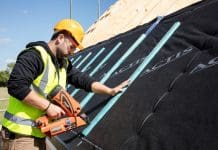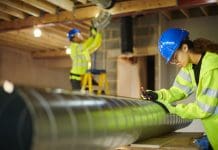Housebuilding in the UK has remained largely unchanged for generations but a new report highlighting the rise of modular construction gives us the opportunity to deliver much-needed new homes and solve the housing crisis, says Steve Cole, director of Make UK Modular
Launched in December 2021, Make UK Modular is the voice of the modular housing industry. Our first major report, Greener, Better, Faster: Modular’s Role in Solving the Housing Crisis is intended to provide a robust picture of the modular housing sector. Compiling this report has been a long and complex process, with data sourced from our members, government, academia and a huge range of third-party organisations.
What we found was that widescale change in the way in which we build new homes at scale has not been seen in the UK for generations. While technology has transformed areas of life such as transport, entertainment and retail, until recently it has had little effect on housebuilding. But that is changing with the advent of a new generation of factory-built modular homes.
Macro challenges facing the construction industry
Everyone in construction, and increasingly just everyone, knows that the UK has not met its housebuilding targets for a generation. We found that not only are we faced with a major labour supply issue, with 25% of the workforce due to retire in the next 10-15 years, but also stubbornly low productivity and innovation rates. Construction is, alarmingly, one of the least productive sectors of the UK economy – falling behind both services and manufacturing. Construction of buildings is actually less productive now than it was 25 years ago.
The construction industry has historically spent far less on research and development (R&D) than almost every sector, bar industries and utilities. Investing just 6% of services R&D spend in 2020, and half of the lowest-spending manufacturing sub-sector.
Poised for growth in response to the housing crisis
We found that modular housing, the production of entire homes in factories as 3D modules, has matured rapidly in the last five years – more than doubling its output despite the Covid-19 pandemic. In 2022, one in every 60 new homes in the UK will be built entirely in a factory. By 2025, Make UK Modular members (who account for about 70% of the market) are on track to expand output by 400% and produce more than 10,000 homes.
Capacity is in place to deliver in excess of 20,000 new modular homes per annum by 2025. This would grow England’s housing supply by 10% and cut the output gap on the government’s housing target by 20%.
Faster, better, lower cost
Factory engineering means modular homes can be built to consistently high standards, for competitive costs, at speed and delivered to sites with hugely reduced disruption. Modular homes are typically built 50% faster and reduce waste by 90% compared to traditional build.
Jobs and productivity
By decoupling employment from areas of high housing demand, modular has been able to tap into a new workforce. Up to 65% of modular’s workforce are in manufacturing jobs, not construction, allowing modular to rapidly expand its workforce. Building in a factory has driven up productivity by over 40% compared with traditional on-site construction.

Cheaper to heat, better for the planet
Modular homes are the greenest new homes being built at scale in the UK – green to build, green to live in. Modular is building homes in the top energy performance bracket, which can deliver a 32% reduction on the average new build home, and a 55% reduction on the average UK home.
Modular tower blocks are built with 45% less whole-life embodied carbon, while modular houses can be built with up to 82% less whole-life embodied carbon.
Investing in R&D and innovation
One of our most striking discoveries is that modular accounts for up to 30% of all R&D spending in the construction of buildings sector. With nearly £1bn of overall investment into modular supporting dozens of new factories and creating nearly 3,000 new jobs.
Opportunities for growth through a supportive policy framework
There is a huge opportunity to be grasped. Private investment has been substantial and the modular sector does not require new financial support from government to fulfil its potential. There are a small number of strategic, effective government policy decisions which can act as a catalyst to help build self-sustaining momentum.
This includes expanding the role of modular in affordable housing provision, offering fast-track planning for all energy-efficient, low carbon housing, alongside prioritising green homes in land allocation and raising energy efficiency standards for new housing. Collectively, these changes would drive up standards across the sector, while offering pipeline security needed to ensure the industry scales up.
There is an enormous opportunity not just for government but for the entire construction sector to be grasped here. While the operating environment is undoubtedly challenging for the entire housebuilding industry, our report shows that the rise of modular can aid in solving the housing crisis and deliver the UK’s much-needed homes: greener, better, faster.
Steve Cole
Director
Make UK Modular
Tel: +44 (0)808 168 5874














